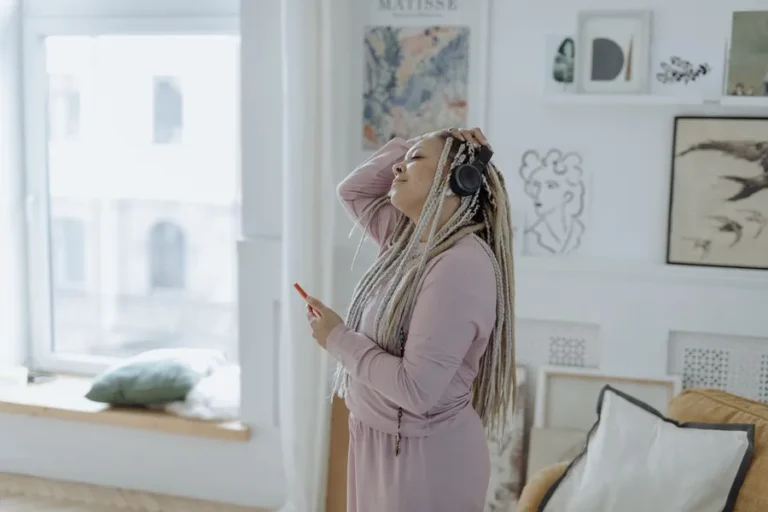Cleaning Paralysis: Beat the Overwhelm with 15 Simple Tips
This post contains affiliate links. I may earn a small commission at no extra cost to you if you make a purchase through these links.
Table of Contents
Have you ever stood amid a chaotic room, fully aware that it’s time to tidy up, but felt planted in place?
It’s not simply about laziness.
Referred to as “cleaning paralysis”, this feeling is a mental and emotional hurdle.
Your desk is piled high with unopened mail, a plate or two, and who knows what kind of sticky substance beneath that three-day-old cup of coffee, is a metaphorical wall.
They’re each a physical reflection of the overwhelm you feel from other aspects of life.
Maybe you’ve been working longer hours than you’d like to admit you can manage; your relationships could be taking too much out of you, or those extra classes could be draining your energy.
Procrastination rears its head, and instead of cleaning, you check in on work or make that missed call.
I know it’s anxiety-inducing, sitting in the mess, screaming at yourself internally.
Yet, you hit play on YouTube and scroll down Instagram a few hours longer. That scatterbrain is avoiding the task at hand – the dishes!
But once you get going and the clean-up is over, there’s an immense sense of relief, and the room’s atmosphere changes.
Recognizing these patterns is the first step, but it doesn’t end there.
So, let’s get into it! Brace yourself, because conquering cleaning paralysis might require more than a scrub brush and a can-do attitude.
Are you ready to take back control of your space? Let’s dive in.
What is cleaning paralysis?
Cleaning paralysis is when you’re so swamped by a messy environment that you can’t start cleaning.
You’re stuck in the middle of chaos and not sure which way to go.
Have you ever looked around a room littered with laundry, dishes, or random clutter and thought, “Where do I even start?”
That’s cleaning paralysis.
It’s an overwhelming feeling that you’re trapped in disarray with no clear path to a cleaner space.
You might think you’re the only one who feels this way, but you’re far from alone.

It’s more common than you’d imagine and affects a broad range of people.
From busy parents struggling to balance work and family, to students dealing with hectic schedules, to professionals with high-stress jobs; cleaning paralysis doesn’t discriminate.
For individuals with ADHD, this feeling can be a daily stressor.
We often face challenges with focus, organization, and task initiation, making the prospect of cleaning seem even more laborious.
Some tasks that might look simple to many can feel overwhelming to us.
The key here is to remember – there’s no one-size-fits-all approach to tackling this.
It’s about finding what works best for you and being kind to yourself along the way.
Decluttering Paralysis
Decluttering’s hard because you have to decide what stays and what goes.
It’s rooted in more than just the physical act of cleaning and is often tangled up in emotions, habits, and sometimes, our mental health.

Why can’t I start decluttering?
- Sentimental Value: Old letters, children’s artwork, or gifts from loved ones – these items can tug at our heartstrings, making it harder to part with them.
- Just In Case: I call this ‘just in case’ syndrome. We tend to keep items thinking we might need them someday. This fear of future regret often leaves us drowning in clutter.
- Decision Fatigue: Constantly making decisions about what to keep or toss can be mentally exhausting. This is apparent for ADHDers, where making decisions and maintaining focus is already challenging.
- Mental Health: Certain conditions like anxiety and depression can sap our energy and motivation. They make it difficult to initiate and follow through with tasks.

If you find it hard to declutter, know that it’s not just about being more disciplined or tidier.
Motivation to Clean Your Room
Cleaning your room might feel like a big task, but it doesn’t have to be a drag.
Finding the right motivation can make it easier and possibly something you’ll want to do more often.
How to motivate yourself to clean your room?
- Create A Reward System: Promise yourself a treat afterward! Finish a little cleaning, and reward yourself with something you like, like a snack or a movie you’ve been dying to see.
- Use Tools You Love: Got a favorite mop or a cleaning spray that smells amazing! Use them! Tools you enjoy make cleaning feel less like work. I use this swiffer mop paired with these reusable mop pads for my hardwood floor. It’s so easy to throw the pads in the wash or just switch one out with another once they become dirty!
- Watch Cleaning Videos or TV Shows: Who isn’t in the cleaning mood after watching Hoarders?
- Make It A Challenge: Think cleaning’s boring? Make it a race.
- Minimize It: Start small, like with just one shelf or a corner of the room. You’ll see progress fast, and it won’t seem so scary.
15 Tips to Clean Without Getting Overwhelmed
Here are 15 of the best ways to beat cleaning paralysis and get into decluttering:
- Time Boxing: Allocate a set amount of time for cleaning each day. Start with just 10-15 minutes and gradually increase as you feel more comfortable.
- One Category at a Time: instead of tackling a whole room, focus on one category of items first – like books, clothes, or kitchenware.
- Three-Box Method: Use three boxes labeled ‘Keep’, ‘Donate/Sell’, and ‘Throw away’ to organize your items during decluttering. (Keep, trash, move)
- Break It Down: Split larger tasks into manageable parts. Instead of cleaning the whole kitchen, start with the sink or a single cupboard.

- Create a Mood Board: Design a mood board with pictures of how you want your space to look after cleaning. It could include inspiring photos from magazines, websites, or your own sketches. A visible representation of your goal can help motivate you to start cleaning.
- Create a Cleaning Schedule: Having a regular cleaning schedule prevents mess from building up and can make tasks seem less daunting.
- Prioritize Tasks: List all cleaning tasks and prioritize them based on urgency or ease. Ticking off tasks from a list can provide a sense of accomplishment.
- The 12-12-12 Challenge: This is a fun and effective method. Find 12 items to throw away, 12 to donate, and 12 to be returned to their proper place.
- Four-Box Method for Sentimental Items: Add an extra box labeled ‘Sentimental’ to the three-box method. This can be for items you find hard to part with. Revisit this box later when you’re ready.
- Seek Support: If the task feels too big, don’t hesitate to ask family members or friends for help. Or hire professional cleaners if necessary and affordable.
- One-Item Rule: Start by deciding on just one item to clean up or put away. The goal is to make the first step so simple that it kickstarts your momentum.
- Set Goals and Track Progress: Write down your cleaning goals and track your progress in achieving them. Seeing your accomplishments on paper can be motivating and rewarding.
- Use Audiobooks or Podcasts: Cleaning doesn’t have to be boring. Turn on an audiobook, podcast, or your favorite music. This can make cleaning feel like less of a chore and more like personal time.
Do you love audiobooks or are eager to give them a try? Click here for a 2-month FREE Audible trial and two audiobooks for free!

- The “One-Year Rule”: If you haven’t used an item for a year and it doesn’t hold significant sentimental value, consider getting rid of it. This rule helps you objectively decide what’s essential and what’s just taking up space.
- Use Before and After Photos: Take a picture of your space before you start cleaning and another one after you’re done. Visual evidence of your success can be a powerful motivator for future cleaning tasks.
My house is a disgusting mess!
Where do you start when a messy house is overwhelming?
Start simple. Clear out a kitchen countertop or arrange your bedside table neatly.
Tackling smaller tasks not only makes an immediate difference but also gives you a sense of accomplishment that helps you push through the bigger tasks ahead.
Takeaway
Facing a messy space is tough when you struggle with cleaning paralysis, but there’s no need to rush through it or avoid facing it- that’s where the overwhelm creeps in.

Think of cleaning like a puzzle – maybe it’s not something to solve all at once when you have paralysis, but one piece at a time.
Be patient with yourself, make a plan, and remember self-compassion along the way.
Start with small tasks, and you’ll soon see progress. If it gets to be much, it’s okay to ask for help – we all need a hand sometimes.
Know someone else facing paralysis when it comes to tidying up?
Did these strategies make a difference in your battle with cleaning paralysis? If they did, why not share the wisdom?
The more we help each other face the clutter, the better we all feel!







